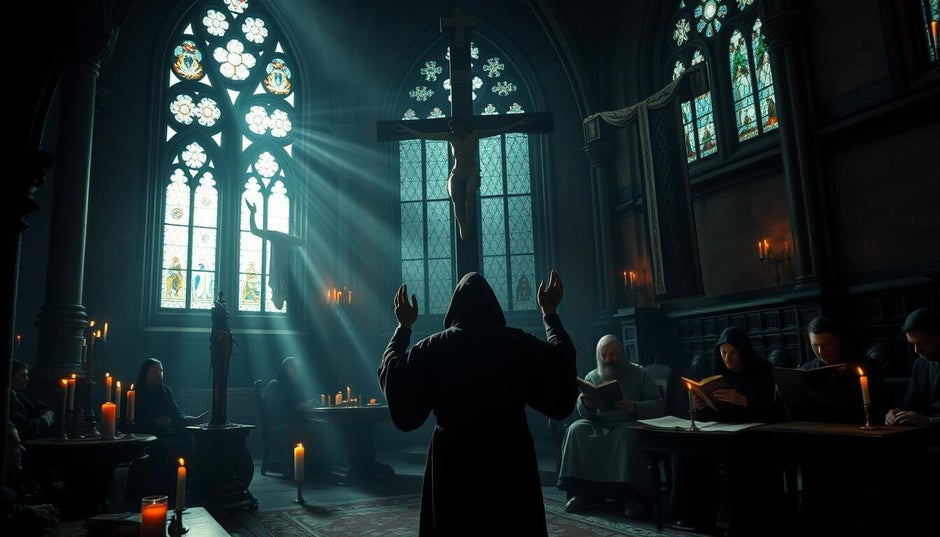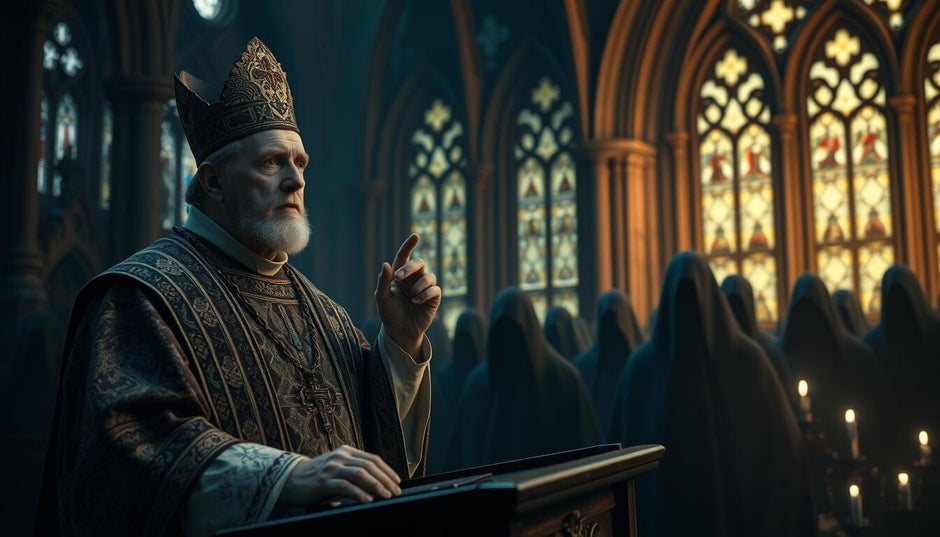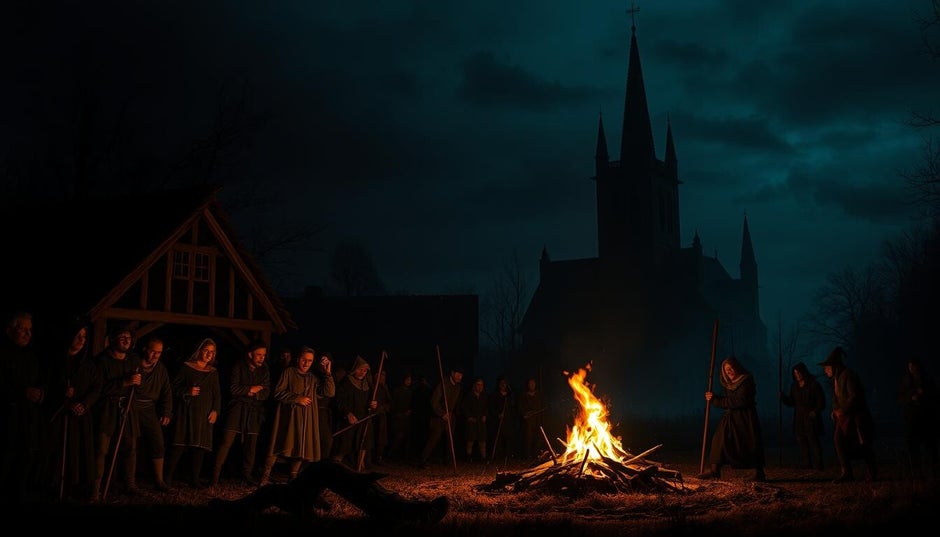Did the rise of Christianity in the Middle Ages redefine the boundaries of magic, or did it merely rebrand existing practices? This question lies at the heart of understanding the complex interplay between Christianity and magic during this period.
The Middle Ages were a time of significant religious, cultural, and social change, and the influence of Christianity on the perception of magic was profound. As Christianity spread, it not only brought about a shift in religious beliefs but also impacted how people viewed and practiced magic.

The redefinition of magic was a multifaceted process that involved the reinterpretation of existing magical practices through a Christian lens. This process was complex, involving both the suppression of certain practices and the incorporation of others into Christian rituals.
Key Takeaways
- The rise of Christianity led to a significant shift in how magic was perceived and practiced.
- The Christian Church played a crucial role in redefining magical practices during the Middle Ages.
- The redefinition process involved both the suppression and incorporation of existing magical practices.
- Understanding this historical context is essential for grasping the evolution of magic.
- The interplay between Christianity and magic reflects broader cultural and religious changes.
Magic and Paganism Before Christianity
Paganism and magic were integral parts of the pre-Christian European landscape, shaping the daily lives and beliefs of its people. The diverse cultures across the continent practiced various forms of magic, often intertwined with their religious beliefs.
Ancient Magical Traditions and Their Practitioners
Ancient magical traditions in pre-Christian Europe were diverse, ranging from healing rituals to divination practices. Practitioners of magic were often revered for their knowledge and skills, which were believed to be derived from supernatural sources. These magical practitioners played significant roles in their communities, providing services that ranged from spiritual guidance to physical healing.
The Respected Role of "Wise Ones" in Pre-Christian Europe
In pre-Christian Europe, "wise ones" were respected figures who possessed knowledge of magic, healing, and the spiritual realm. These individuals were often sought out for their wisdom and ability to communicate with the divine or supernatural forces. Their roles were multifaceted, involving not just magical practices but also serving as mediators between the community and the spiritual world.
The Church vs. the Wise Ones: How Christianity Redefined Magic in the Middle Age
Christianity's influence on medieval society led to a significant shift in how magic was perceived and practiced. As the Christian Church gained power, it began to redefine magic, viewing it as a threat to its authority.
Theological Basis for Demonizing Magical Practices
The Church's theological basis for demonizing magical practices was rooted in its teachings on the nature of evil and the supernatural. Magical practices were seen as being derived from demonic forces, and thus, were considered heretical. The Church emphasized that any supernatural power not derived from God was, by definition, demonic.
Key theological arguments against magic included:
- The belief that magic was a form of idolatry, diverting worship from the one true God to demonic entities.
- The notion that magical practices involved explicit or implicit pacts with the devil.
- The understanding that magic disrupted the natural order established by God.
From Healers to Heretics: The Transformation of Folk Practitioners
Folk practitioners, once respected for their healing abilities and knowledge of natural remedies, were gradually transformed into heretics. The Church's campaign against magic led to a widespread persecution of these individuals, who were often accused of witchcraft.
The Canon Episcopi and Official Church Positions
The Canon Episcopi, a significant Church document from the 10th century, played a crucial role in shaping the official stance on magic. It condemned the practice of magic and outlined the Church's position on the matter, influencing later theological and legal treatises on witchcraft.

The redefinition of magic by Christianity during the Middle Ages had profound implications for society, leading to the persecution of individuals once revered for their knowledge and skills. Understanding this historical context is crucial for grasping the complex dynamics between religion, magic, and society.
The Social and Cultural Impact of Magic's Redefinition
As Christianity redefined magic, the consequences rippled through the fabric of medieval life, affecting various aspects of society and culture. The once-respected practitioners of folk magic found themselves at the center of a maelstrom of fear and persecution.
The Rise of Witch Hunts and Systematic Persecution
The redefinition of magic led to the rise of witch hunts, as the Church and secular authorities began to systematically persecute those accused of witchcraft. This period was marked by intense fear, leading to the scapegoating of individuals, often under dubious accusations.

Gender Dynamics in Magic Accusations
Interestingly, the accusations of magic were not gender-neutral. Women were disproportionately targeted, often due to societal biases and the roles they played in their communities. This gendered aspect of witch hunts highlights the complex interplay between social norms and religious persecution.
Survival and Adaptation of Folk Practices Under Christian Influence
Despite the persecution, many folk practices survived or adapted under the veneer of Christian rituals and beliefs. This syncretism allowed elements of pre-Christian magical traditions to continue, albeit in a modified form.
Legacy of Redefining Magic
The redefinition of magic by Christianity in the Middle Ages has had a lasting impact on society and culture. As discussed, the early Christian church demonized magical practices, transforming the perception of folk practitioners from respected community members to heretics.
This shift led to the rise of witch hunts and systematic persecution, disproportionately affecting women. Despite this, folk practices continued, adapting to the new Christian landscape. Understanding the impact of Christianity on magic provides insight into the complex dynamics of power, culture, and belief.
The legacy of this historical process continues to influence contemporary views on magic and the supernatural. By examining the past, we can better appreciate the intricate relationships between religion, culture, and societal norms, ultimately enriching our understanding of the world around us.
FAQ
What was the primary influence of Christianity on the concept of magic in the Middle Ages?
Christianity significantly redefined the concept of magic, viewing it as demonic and associated with heresy, thus changing the perception of magical practices from being a part of cultural and folk traditions to being malevolent.
How did the Christian Church view magical practices before its advent in Europe?
Before Christianity, magical practices were a part of the cultural fabric, with "wise ones" being respected for their knowledge and healing abilities, indicating a more integrated and less stigmatized view of magic.
What was the role of the Canon Episcopi in shaping the Church's stance on magic?
The Canon Episcopi was a significant Church document that helped shape the official stance on magic by condemning certain practices as heretical, thus influencing the Church's position on magic and its treatment of those accused of witchcraft.
How did the redefinition of magic by Christianity impact folk practitioners?
The redefinition led to the transformation of respected folk practitioners, known as "wise ones," into heretics, resulting in persecution and the rise of witch hunts, significantly impacting the social and cultural fabric of Europe.
What were the gender dynamics behind accusations of magic during the Middle Ages?
Accusations of magic often had a gendered dimension, with women being disproportionately targeted and accused of witchcraft, reflecting broader societal attitudes towards gender and power.
How did folk magical practices survive or adapt under Christian influence?
Despite persecution, folk magical practices managed to survive and adapt, often by being assimilated into Christian practices or by being practiced in secret, demonstrating the resilience of cultural traditions.
What was the overall social and cultural impact of the Church's redefinition of magic?
The redefinition of magic by the Christian Church had a profound impact on European society and culture, leading to the persecution of individuals accused of witchcraft, influencing gender dynamics, and shaping the way people understood and practiced magic.

Add comment
Comments